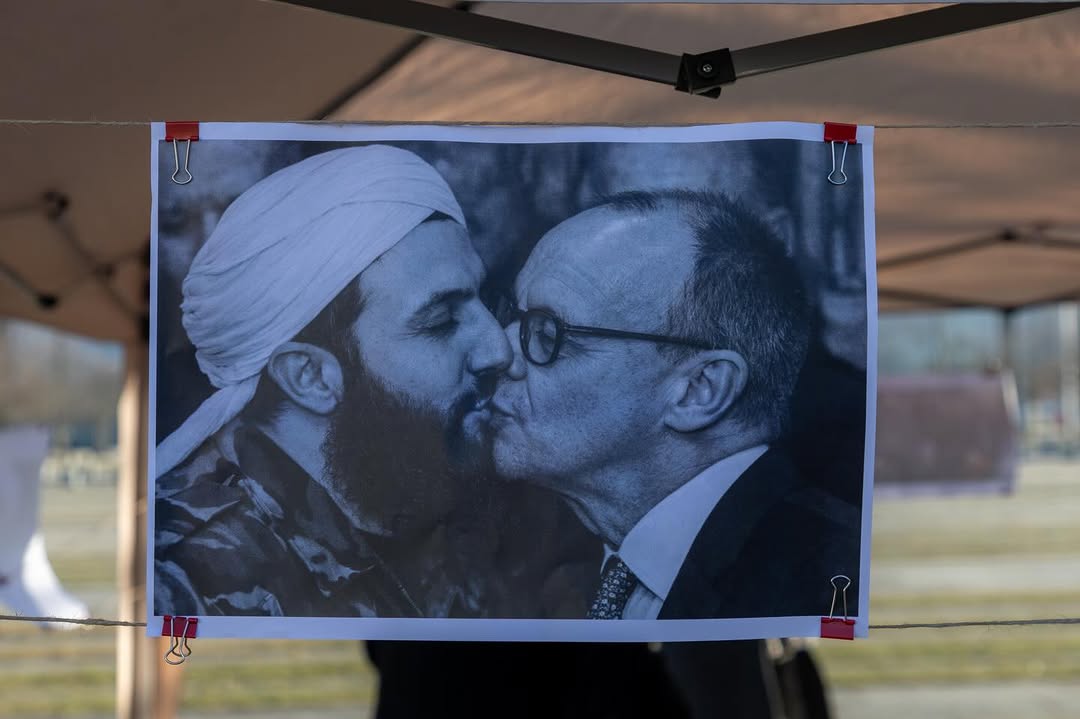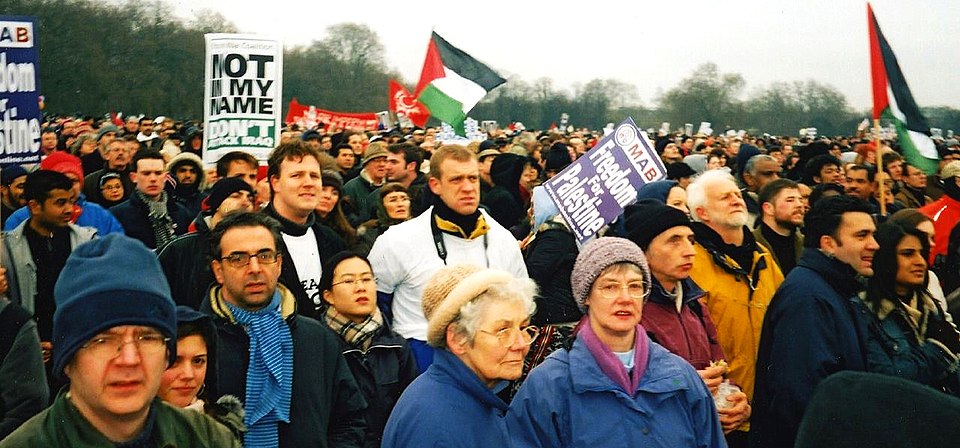After looking at some discussions among anti-imperialists, I argue that the movement requires an anti-imperialist pole if it is to move forward.
Just how large was the anti-war demonstration on 27th February? The organisers counted 500,000 people. This would make it as large as the great demonstration against the Iraq war in 2003. But that was a national demo – buses came in from Stuttgart, 400 miles away. Last week’s demo was just for Berliners.
Other reports are more conservative, estimating more than a hundred thousand. This is more comparable to the unteilbar demonstration for refugees in 2018. Either way this was a massive mobilisation, which is even more impressive as the coronavirus pandemic continues, and many people are not prepared to take to the streets.
The fact that a massive anti-war movement has emerged, almost spontaneously, shows that millions want to stop Putin’s aggressive warmongering and that this movement is extremely heterogeneous.
Judging from the many home-made placards, there seem to have been at least four groups of people:
(1) people opposing all imperialisms;
(2) people calling for Western intervention;
(3) people solely against Putin (often calling him a Nazi);
(4) people who just want the war to stop.
Group (4) seems to be the largest by far, and group (3) has some support. Groups (1) and (2) are fairly marginal at the moment, but this can change quickly.
Arming the Ukrainian resistance?
Some placards at the demo thanked German Chancellor Olaf Scholz for increasing the war budget by €100 billion and sending weapons to Ukraine. This budget increase is unprecedented and commits Germany to spend 2% of the GDP on “defence” (ie the military).
Some people opposing the invasion seem to believe that the Bundeswehr and NATO are benign forces which have the interests of ordinary Ukrainians at heart. It is almost as if the invasion of Iraq and the destabilisation of countries like Venezuela, Cuba and Chile were a mistaken lapse of judgement by this “defensive alliance”.
But isn’t Putin the aggressor this time? Hillary Clinton recently made a comparison of the current crisis with the Russian invasion of Afghanistan in the 1980s: “It didn’t end well for the Russians … but the fact is that a very motivated, and then funded, and armed insurgency basically drove the Russians out of Afghanistan.”
True, writes Ali Abunimah in the Electronic Intifada, but “what Clinton did not mention is that it didn’t end well for the people of Afghanistan either. They have suffered more than 40 years of war, including the 20-year US invasion and occupation. Now the people there are just being left to starve.”
As Wolfgang Streeck argued in the New Left Review: “One thing EU-Europeans, especially those of the Green kind, are currently learning is that if you allow the US to protect you, geopolitics trumps all other politics, and that geopolitics is defined by Washington alone. This is how an empire works.”
German or NATO weapons are not sent without conditions, and any arming of Ukrainian rebels will be inevitably accompanied by an attempt by NATO to gain military and geopolitical influence in the region.
Is Putin a Nazi / madman?
Several placards on the demo compared Putin with Hitler. Similar arguments can be heard in wider society. People as diverse as Ireland’s deputy premier Leo Varadkar and Fleetwood Mac singer Stevie Nicks have called Putin a “new Hitler“. Time magazine posted a front cover of Putin with a Hitler moustache.
Try putting “new Hitler“ into a search engine. Apart from Putin, you’ll find results for Iran’s Ayatollah Ali Khamenei, Egypts 1950s president Gamal Abdul Nasser, Muammar Gadaffi, Saddam Hussein, a coach of the Independence Community College football team, and many more.
“New Hitler“ has become shorthand for “anyone who US imperialists are currently targetting. The comparison insinuates that Putin is about to carry out an industrial Holocaust and that his invasion of Ukraine is categorically worse than Saudi Arabia’s similar attacks on Yemen or Israel’s on Palestine.
Others depict Putin as a madman. The Guardian reported Putin’s “bizarre speech“ as being “not rational”. As Jonathan Cook noted sardonically “How convenient for western leaders that every time another country defies the West’s projection of power, the western media can agree on one thing: that the foreign government in question is led by a madman, a psychopath or a megalomaniac.”
Cook goes on: “The subtext … is that something must be done to stop the ‘madman’. And because he is irrational and a megalomaniac, such action must never be framed in terms of concessions or compromise – that would be appeasement, after all. If every enemy is a new Hitler, no western leader will risk a comparison with Neville Chamberlain.”
Arguments within the anti-imperialist movement
As a new movement emerges, there will inevitably be differences of opinion between people who do not share exactly the same analysis of the situation. We discovered this recently, when the Berlin LINKE Internationals statement against war, (of which, for the sake of transparency, I was one of the many authors). In this sense, I would like to comment on some discussions that are currently troubling our movement.
Peace through Sanctions?
The biggest discussion the LINKE Internationals had was whether we should demand sanctions against Russia. In the end, we could not reach a consensus. Our discussion was probably different to anything else you’d hear on the German left: “BDS calls for sanctions”, went the argument, “so why shouldn’t we call for sanctions of Ukraine?”
One difference is that BDS is a call from Palestinian civil society. In this case, the call for sanctions is coming largely from the West. This is dangerous, as sanctions have tended to be used to enforce imperial power. On the last Spaßbremse podcast, Dominik Leusder called sanctions “a weapon of war – they are often perceived as alternatives to war where in fact they are acts of war themselves.” The Geneva International Centre for Justice estimates that “around 1,500,000 Iraqis, primarily children, died as a direct consequence of the imposed sanctions” on Iraq.
Moreover, who will be hit by sanctions? As Leusder explains in Jacobin: “the decline in the ruble’s purchasing power mainly hits Russia’s citizens, who can buy fewer domestic and imported goods with their rubles.” The Left Voice website reports a “economic sanctions increase wealth disparities and further impoverish working-class and poor people”.
Grace Blakeley argues in Tribune that in 2014 sanctions “did have a significant impact on the Russian economy at the time.” And yet, as Yaak Pabst remarks: “Rather than rising up against their president Putin, in 2018 Russia’s people voted Putin back in with a record result.” The effect of the sanctions was rather to bind people with their ruler against a perceived attack from outside.
At the moment, many Russians are rising up against Putin. Thousands of brave people have been arrested. Sanctions could effectively demobilise this inspiring movement.
No Fly Zones
Another idea which is gaining some traction is the imposition of no fly zones. But, as John Molyneux asked on facebook: “Who will enforce the ‘No fly zone’? Obviously NATO or the US. And what happens when they shoot down the first Russian plane or planes? Clearly this is a recipe for all -out war with all its consequences.”
The most recent edition of the Corner Späti podcast read out a letter from a Leftist in Ukraine warning that “measures like opening a no-fly zone would even result in a direct confrontation between Russian and NATO, which as everyone knows, would be a nuclear one.”
Bans of Russian products
Another suggestion is to ban Russian products. This has so far included a university dropping a course on Dostoevsky, an orchestra refusing to play Tchaikovsky, the ban of both Russian and Ukrainian athletes from the Paralympics, Netflix halting an adaptation of Anna Karenina, and the cancellation of a Russian ballet by a UK company with no links to the Russian state.
This is reminiscent of the heat of the Iraq war. When France did not wholeheartedly support the offensive, US-Americans started to rename “French fries“ “freedom fries“. Blaming everything Russian cuts us off from the opposition developing inside Russia.
Opposition to war in Germany
Some significant German organisations and individuals have criticized the massive increase in the military budget. Former trade union leader, now Green MP, Frank Bsirske spoke out against the “armament consensus. JUSOS (SPD youth) leader Jessica Rosenthal opposes “a recovery package for the arms industry.”
The trade union federation, the DGB, issued a statement “Stop war immediately! Ceasefire Now!”, They stated: “the sustained increase of the arms budget to fulfil NATO’s goal of 2% is viewed critically by the DGB and the trade unions which comprise the DGB. The urgently necessary investment for the future in social-ecological transformation and in the performance of our welfare state must remain guaranteed.”
The DGB statement is far from perfect, but it can be a basis for organising opposition to Germany’s war drive at the point of production.
An open letter from young activists states“We find the special funds of 100 billion Euros for armament to be the wrong decision – in won’t help people in Ukraine! Even worse: if we plan that more than 2% of the budget should flow each year into the German army, we will soon be living in the third largest military state!”
The German government is using words of peace to endorse its pro-war position, and, until last week, the German anti-war movement was old and largely moribund. The new movement is still finding its feet and striving towards some political clarity. Anyone on the Left should be part of this discussion. The movement must be broad but without an anti-imperialist pole, the movement may fall in behind calls for war against its better judgement.
Let us unite to oppose Putin’s aggression, but not allow ourselves to be pawns for those who want to use our desire for a peaceful world to wage their own wars.
What can we do?
The Ukrainian Leftist cited above asks “citizens of rich western countries to call for the construction of humanitarian corridors in Ukraine to save civilian lives. A negotiated compromise to end the war would be the best solution, but unfortunately this currently seems very unlikely to succeed.”
Networks are developing to help Ukrainian refugees, often organised by Eastern Europeans inside Germany. The least that we can do is to support and promote them, and to raise the call that Western countries accept all refugees, especially the BIPoC who are being systematically denied entry.
It won’t be easy, but as internationalists, we must show solidarity with all genuine grass roots movements around the world, and end the temptation to side with our leaders, who have only ever brought war and poverty.
The newly formed Socialist Against the War Coalition in Russia has published a manifesto which argues: “This country belongs to us, not a handful of distraught old men with palaces and yachts. It is time to take it back. Our enemies are not in Kiev and Odessa, but in Moscow. It is time to kick them out. War is not Russia. War is Putin and his regime. That is why we, Russian socialists and communists are against this criminal war. We want to stop it in order to save Russia.”




